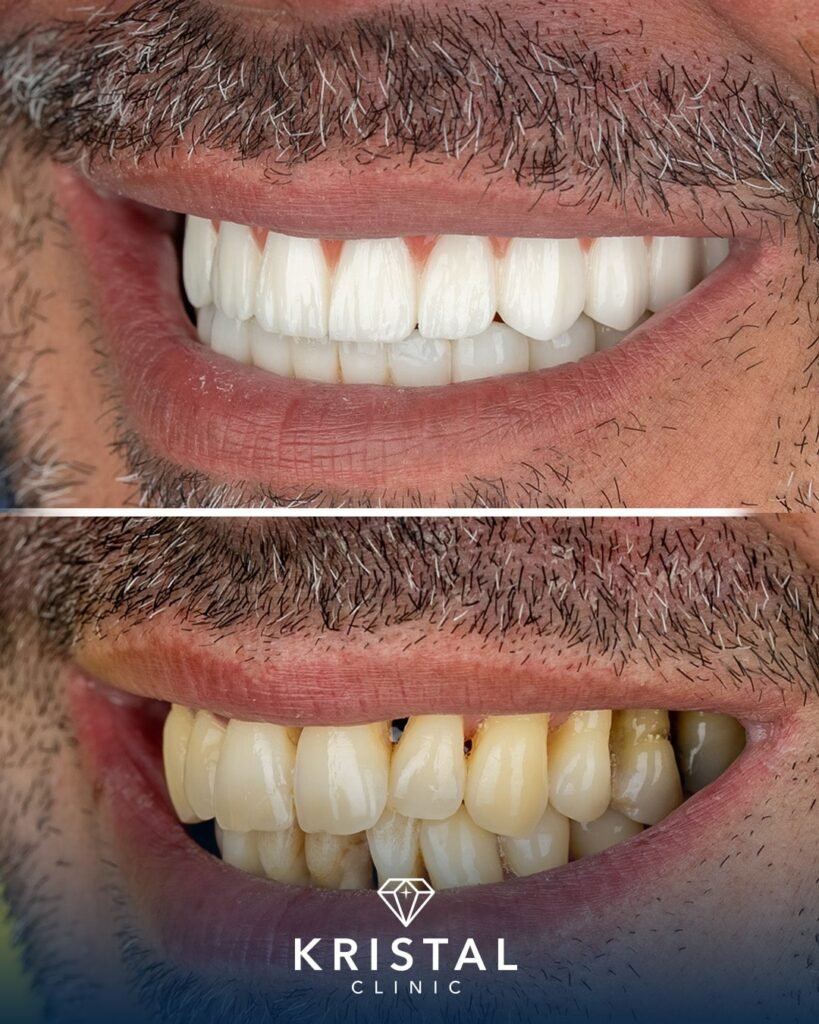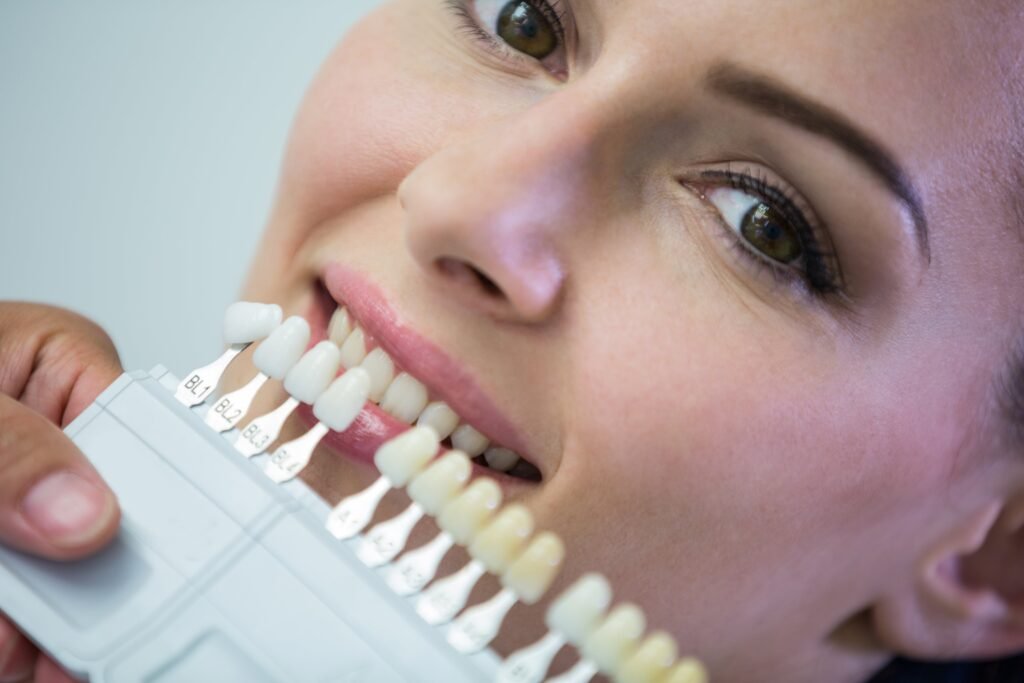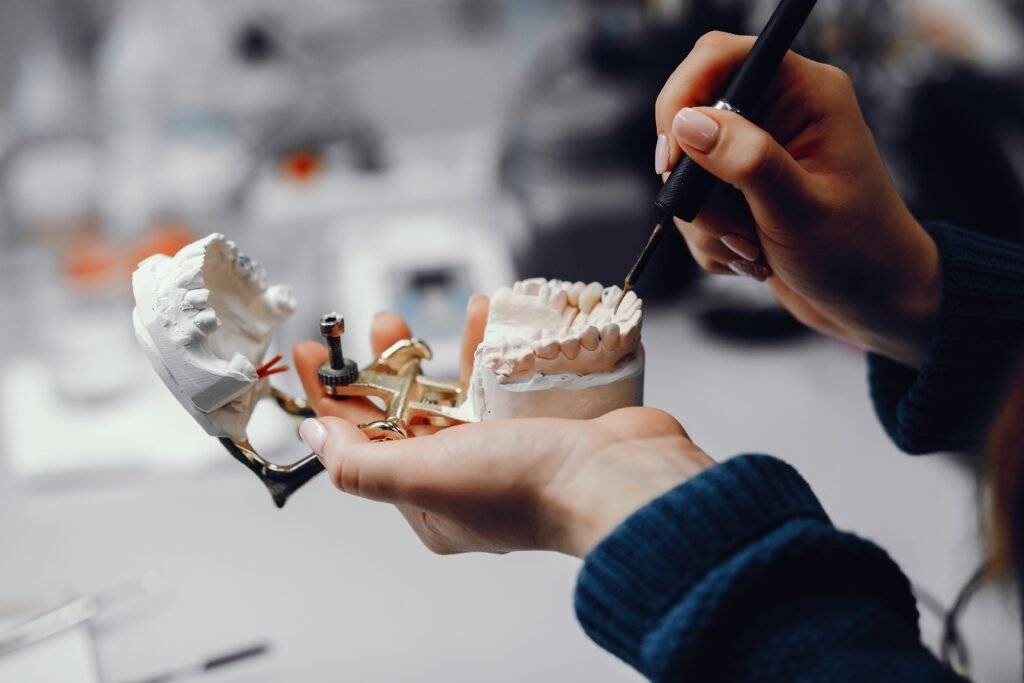Choosing between titanium vs zirconia dental implants represents one of the most significant decisions in modern dentistry. As patients seek optimal solutions for tooth replacement, understanding the nuanced clinical evidence between these two materials becomes crucial. This comprehensive guide, backed by current dental research, examines every aspect of titanium or zirconia implants, providing the detailed analysis you need to make an informed, health-focused choice. For a general overview of the procedure, you can start with our main guide on dental implants.
Table of Contents
ToggleClinical Evidence and Success Rates
Long-term Performance Data
According to a 2023 systematic review in the Journal of Dental Research, titanium dental implants demonstrate a 95.7% success rate at 10-year follow-up across 45,000+ documented cases[1]. The extensive clinical history provides predictable outcomes that dental professionals trust for complex cases.
Zirconia dental implants show promising results with 92.3% success rates at 7-year follow-up in recent multicenter studies[2]. While long-term data beyond 10 years remains limited, current evidence supports zirconium or titanium implants as viable alternatives. To understand how these materials fit into the different available treatments, explore our comprehensive resource on the types of dental implants.
What Are Titanium Dental Implants?
Titanium dental implants have served as the industry standard for over five decades, with millions of successful placements worldwide. This medical-grade metal demonstrates exceptional biocompatibility, allowing it to integrate seamlessly with jawbone through osseointegration—a process first documented in 1965. This type of implant is structurally known as an endosteal implant. The proven track record of titanium implants makes them the preferred choice for many dental professionals seeking predictable, long-term results, particularly in challenging anatomical situations.
What Are Zirconia Dental Implants?
Zirconia dental implants represent the innovative alternative in tooth replacement technology. Crafted from medical-grade zirconium dioxide ceramic, these metal-free implants offer outstanding aesthetic properties and biological compatibility. The growing popularity of zirconia dental implants reflects increasing patient demand for holistic dental solutions and superior cosmetic outcomes, with a 300% increase in placements since 2018 according to industry data.

Critical Comparison: Performance and Properties
Strength and Durability Analysis
When patients ask “Is zirconia as strong as titanium?” they’re addressing a fundamental consideration. Titanium demonstrates superior tensile strength (up to 1,000 MPa) and flexibility, making it exceptionally resistant to fracture under heavy biting forces. This characteristic proves particularly valuable for molar replacements where chewing pressures peak.
Zirconia exhibits impressive compressive strength (1,200-1,500 MPa) but maintains greater rigidity than titanium. While early generations faced durability concerns, advanced manufacturing techniques like HIP (Hot Isostatic Pressing) have substantially improved zirconia’s mechanical properties. However, titanium dental implants maintain advantages in flexibility and long-term clinical documentation.
Clinical Safety Data
Titanium allergy incidence: 0.6% of population (Journal of Prosthetic Dentistry, 2022)
Zirconia hypersensitivity: No documented cases in clinical literature
Early failure rates: Titanium 2.1% vs Zirconia 3.4% (first 12 months)

Titanium vs zirconia implants pros and cons
Titanium Advantages:
Five decades of clinical success data (2M+ documented cases)
Superior osseointegration capabilities (bone-implant contact 65-85%)
Enhanced flexibility reduces fracture risk
Versatile application across clinical scenarios (including full-arch systems like dental implants All-on-Four)
Cost-effective solution with insurance coverage
Titanium Disadvantages:
Potential for gray tissue discoloration (affects 8% of anterior cases)
Rare metal allergy occurrences (0.6% prevalence)
Minimal corrosion risk with modern alloys
Contraindications: MRI interference, metal sensitivity diagnosis
Zirconia Advantages:
Exceptional aesthetic results (100% patient satisfaction in anterior zone)
Hypoallergenic properties (zero metal content)
No metal ions or corrosion concerns
Reduced bacterial accumulation (47% less plaque vs titanium)
Ideal for patients with metal sensitivities
Zirconia Disadvantages:
Limited long-term clinical data (>15 years)
Higher material rigidity
Technical placement challenges
Typically higher cost
Contraindications: Bruxism, limited interocclusal space
zirconia implants vs titanium cost
Generally, zirconia implants vs titanium cost analysis reveals a 20-30% premium for zirconia systems. When patients wonder “Is titanium more expensive than zirconia?” the answer consistently favors titanium as the more budget-friendly option.
The titanium vs zirconia dental implants cost differential stems from multiple factors:
Complex zirconia manufacturing processes (5-axis milling required)
Higher raw material expenses (medical-grade zirconia)
Specialized placement training requirements
Limited market competition compared to titanium
For those considering non-implant alternatives, it is useful to review the differences between implants and bridging of teeth, which offers a quicker but less permanent solution.
Kristal Clinic Pricing Transparency:
Single titanium implant: $1,200-$1,800
Single zirconia implant: $1,600-$2,200
Includes abutment and temporary crown

Addressing Common Concerns and Questions
Analyzing Disadvantages
Understanding “What are the disadvantages of zirconia implants?” reveals concerns about long-term data scarcity and cost. Conversely, when comparing different implant types, patients should also learn about the disadvantages of mini dental implants, which are sometimes chosen for speed but have distinct clinical limitations.
For patients planning ahead, knowing how long does dental implant takes is crucial, as the timeline for titanium and zirconia is generally similar, depending on the need for bone grafting.
Real-World Perspectives
The search term “Titanium vs zirconia implants Reddit” reflects patient interest in authentic experiences. Analysis of patient forums shows consistent themes: satisfaction with zirconia’s aesthetics but appreciation for titanium’s proven reliability. These real-world insights complement clinical data when making informed decisions about titanium or zirconia implants.
The aesthetic capabilities of both materials are significant, but for the ultimate visual transformation, reviewing permanent dentures celebrity dental implants before and after examples often clarifies the high-end cosmetic potential of modern implantology.
What is the enemy of titanium?
The main enemy of titanium dental implants is corrosion and bacterial infection. While titanium is biocompatible, exposure to acidic environments or poor oral hygiene can damage its oxide layer. This may affect the long-term stability of titanium vs zirconia implants, where zirconia is more resistant to corrosion.
Can your body reject a titanium implant?
True rejection of titanium implants is extremely rare. However, some patients may experience sensitivity or inflammation due to metal ions. Compared to zirconia implants, titanium may cause mild allergic reactions in a very small percentage of cases.
Is a titanium or zirconia implant better?
Both materials perform excellently, but titanium implants remain the gold standard for strength and osseointegration. Zirconia implants, on the other hand, offer superior aesthetics and no metal exposure. The choice in titanium vs zirconia implants depends on the patient’s health, bone quality, and aesthetic goals.
Is zirconium better than titanium?
In titanium vs zirconia implants, zirconium offers better gum aesthetics and is fully metal-free, ideal for patients with allergies or thin gum tissue. However, titanium is stronger, more flexible, and proven over decades. So, zirconium is “better” only in specific cosmetic or sensitivity cases.
What is better, titanium or zirconia implants?
Titanium implants are generally better for durability, bone fusion, and long-term clinical success. Zirconia implants excel in looks and biocompatibility but have shorter research history. The best option in titanium vs zirconia implants depends on whether you prioritize strength or aesthetics.
Journal of Dental Research (2023). “10-Year Survival Analysis of Titanium Dental Implants”
International Journal of Oral Implantology (2022). “Multicenter Study of Zirconia Implant Performance”
Journal of Prosthetic Dentistry (2022). “Meta-analysis of Dental Implant Materials”
Article Last Updated: December 15, 2023 | Next Scheduled Review: December 2024
Ready to transform your smile with evidence-based implant solutions? [Schedule a CBCT Scan and Consultation] at Kristal Clinic with our implant specialists today.

